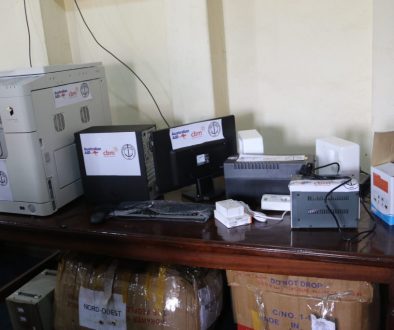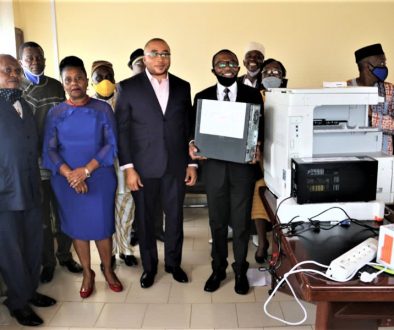Ensuring Eye Care Everywhere
By Njoka Divine Ngwang
The human senses are our contact to the environment. By far, the most important organs of sense are our eyes. We perceive up to 80 per cent of all impressions by means of our sight and if other senses such as taste or smell stop working, it’s the eyes that best protect us from danger.
According SightSavers, about 36 million people are blind in the world today. This figure could rise to 115 million by 2050 but 75 per cent of sight loss can be cured or prevented.
WHO 2015 statistics also reveals that of the 253 million visually impaired persons in the world, 36 million were blind and 217 million had severe to moderate visual impairment. It is noted that 55% of this blind population were women (139 million). This gender difference stems from the longer life expectancy of women compared to men, women’s greater risk of developing certain eye conditions, and women not having the same access to eye health services due to multiple socio-economic and cultural factors.
October 11 is World Sight Day. This year’s awareness day focused on the theme, “Eye Care Everywhere.” This means everyone everywhere needs good eye care. WHO and the Global Action Plan, with the International Agency for the Prevention of Blindness have always encouraged partners to continue with the rolling theme, “Universal Eye Health.”
The CBC Health Services in partnership with CBM Australia and Australian Aid (AusAID) have made significant progress in ensuring eye care everywhere in Cameroon. In 2014, the CBC Health Services started the first official retinal eye care clinic in Cameroon which at that time was serving millions of Cameroonians who were attended to by one well-trained retinal surgeon.

Down the road, millions more Cameroonians are being attended to with so many success stories. Hustaincia Ya narrates how her cataract which started in 2015 had been treated at Banso Baptist Hospital (BBH). “In 2015, I had problems with my vision and at BBH a surgery was done on my first eye on March 1. Two days later, Dr. Beri Ngong carried out the same procedure to correct the second eye. Afterwards, my vision was restored,” narrates Hustaincia as she beams with joy.
The Program Manager for the Socio-Economic Empowerment of Persons with Disabilities (SEEPD), Mr. Awah Jacques Chirac says, “The CBC Health Services started eye services since 1981 at Banso Baptist Hospital. Over the years, it has grown and spread across the country. It provides comprehensive eye care services in almost all her health facilities located in the seven regions of Cameroon.”
Today, over a quarter of a million Cameroonians are living with blinding conditions, which points out the burden of blindness in Cameroon.
“Through the years, the introduction of some specialties such as retinal eye health, retinal, low vision eye care, and pediatric eye health are significant achievements of the CBC Health Services” states the SEEPD Program Manager.
Unfortunately, many Cameroonians are not very aware of the eye care services the CBC Health Services has put at their disposal. World Sight Day 2018 was therefore an opportunity for the organization to sensitize Cameroonians about the eye services she offers.
“Not many Cameroonian are aware of the retinal eye services we offer at Baptist Hospital Mutenege, the pediatric eye services we offer at Mbingo Baptist Hospital, low vision and retinal services offered at Banso Baptist Hospital,” adds Mr. Awah.
Julius Nwongong, an Ophthalmic Nurse at Nkwen Baptist Health Center Bamenda, reveals that the commonest eye defects he attends to at the health centre are: allergic-conjunctivitis, glaucoma, cataract, and uveitis. He insists that it is advisable for everyone to do constant eye checkups to prevent eye complications. Dr. Beri Ngong Dimla, Ophthalmologist at Banso Baptist Hospital, reiterated the same message in an interview she granted to the state radio (CRTV) on the occasion of World Sight Day 2018.
Statistics reveal that 53% of patients who consulted in CBC Health Services facilities in the past 5 years for eye-related conditions are women with the most seeking eye care for glaucoma, cataract and allergic conjunctivitis as well as many other eye conditions.
However, the combination of a growing and ageing population will result in a massive increase in the number of people who are blind or have moderate to severe visual impairment. Other factors that also present a major risk for the future are the dramatic increase currently seen in all parts of the world in the number of people with diabetes and those with high myopia.
Risk has been identified that an estimated 703 million people could be visually impaired by the year 2050. What then is the way out? Early diagnosis, management and adherence to treatment are highly recommended. In addition, massive investment is needed in eye health services along with the protection from out-of-pocket payments (insurance schemes such as BEPHA and Mutual Health) for the poorest sectors of society. These will help ensure universal access to eye health for all and to avert a further human and societal catastrophe.
Professor Tih Pius Muffih, Director of CBC Health Services, used the opportunity to state strongly, CBC Health Services’ profound gratitude to all her partners; Australian Aid and CBM Australia that have sacrificially supported access to eye health to the Cameroonian population.
He says the partners have created a great impact in the lives of people “by promoting inclusive eye care, supporting outreach services, facilitating the setting-up of subspecialties in eye care including, uveitis, retinal and low vision as well as subsidizing cost of services.
“On average, for the past five years, the CBC Health Services’ eye services have reached 190,332 people with over 50,929 (27%) accessing services in remote communities through outreach services,” adds the Director of Health Services.
As one of its strategies in commemorating this year’s World Sight Day, all drivers in the Cameroon Baptist Convention were screened for visual impairment. Statistics from this screening will be carefully analyzed to inform decision-making. As an organization, the CBC Health Services is determined more than ever to continue with this responsibility to have eye care everywhere.



